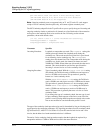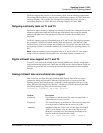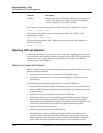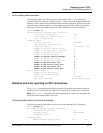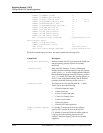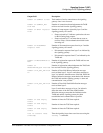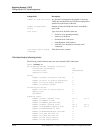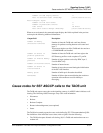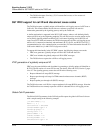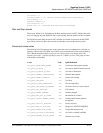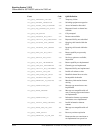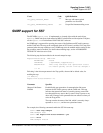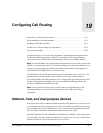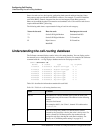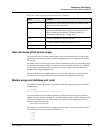
18-20 Preliminary May 9, 2000 APX 8000/MAX TNT/DSLTNT Physical Interface Configuration Guide
Signaling System 7 (SS7)
Cause codes for SS7 ASGCP calls to the TAOS unit
• The TAOS unit reports User busy (17) if it cannot find a route, or if no resource is
available for the call.
SS7 IPDC support for call ID and disconnect cause codes
The TAOS unit reports a globally unique call identifier to call-logging servers for SS7 data or
VoIP calls. This feature enables the NavisAccess software to associate call statistics
information generated by the signaling gateway and by the TAOS unit.
A similar mechanism is supported in the H.323 VoIP context, where a well-defined globally
unique call ID is set by the originating endpoint. This call ID is used to associate remote access
server (RAS) signaling with the modified Q.931 call control signaling used in H.225.0 call
setup. In an H.323 VoIP environment, the TAOS unit reports the call ID to call-logging servers
when a call is connected, maintained, and terminated. (H.323, Q.931, and H.225.0 are ITU-T
recommendations for voice communication over networks.) For more information about H.323
VoIP see the MultiVoice for MAX TNT Configuration Guide.
To support this functionality in the SS7 IPDC context, the following changes were made:
• IPDC now generates a globally unique call ID for SS7 VoIP and data calls.
• IPDC now includes the globally unique call ID in IPDC messages.
• The TAOS unit now reports the call ID to call-logging servers.
IPDC generation of a globally unique call ID
IPDC uses the same definition and algorithm for generating a globally unique call Identifier as
H.225.0. The ID consists of a record of 16 octets. For details, refer to H.225.0, Version 2, pages
44 to 47. The signaling gateway creates the call ID in the following cases:
• Request inbound call setup (RCSI) message
• Request pass-through call setup for TDM connection between two channels (RCST)
message
• Request packet pass-through call (RCCP) message
The TAOS unit creates a call ID for a request outbound call setup (RCSO) message. Note that
the TAOS unit does not currently report the call ID of outbound calls to call-logging servers.
Global-Call-ID parameter
The Global-Call-ID parameter in the Call-Info profile reports the global call ID and is shown
with a sample setting in the following example:
[in CALL-INFO/{ 3 }]
mbid* = { 3 }
call-service = switched
called-number-type = 2
nailed-up-group = 1
call-by-call = 0
phone-number = ""
transit-number = ""
billing-number = ""
switched-call-type = 67



